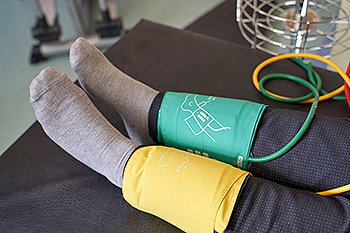Items filtered by date: May 2024
Diabetes and Foot Complications

Foot complications are prevalent in individuals with diabetes and can lead to severe consequences if left untreated. Neuropathy, or nerve damage, can result in loss of sensation, making it difficult to detect injuries or wounds. Skin changes, calluses, and foot ulcers are common due to reduced circulation and impaired healing. In severe cases, untreated ulcers can lead to infections, sometimes necessitating amputation. Preventive measures include daily foot inspections, wearing proper footwear, and regular podiatric care. If you have diabetes, it is strongly suggested that you include a podiatrist on your healthcare team. This medical professional can assess your foot health, provide education on foot care, and help manage possible complications.
Diabetic foot care is important in preventing foot ailments such as ulcers. If you are suffering from diabetes or have any other concerns about your feet, contact Harvey Jacobs, DPM from Quality Foot Care Center. Our doctor can provide the care you need to keep you pain-free and on your feet.
Diabetic Foot Care
Diabetes affects millions of people every year. The condition can damage blood vessels in many parts of the body, especially the feet. Because of this, taking care of your feet is essential if you have diabetes, and having a podiatrist help monitor your foot health is highly recommended.
The Importance of Caring for Your Feet
- Routinely inspect your feet for bruises or sores.
- Wear socks that fit your feet comfortably.
- Wear comfortable shoes that provide adequate support.
Patients with diabetes should have their doctor monitor their blood levels, as blood sugar levels play such a huge role in diabetic care. Monitoring these levels on a regular basis is highly advised.
It is always best to inform your healthcare professional of any concerns you may have regarding your feet, especially for diabetic patients. Early treatment and routine foot examinations are keys to maintaining proper health, especially because severe complications can arise if proper treatment is not applied.
If you have any questions please feel free to contact our office located in Somerset, NJ . We offer the newest diagnostic and treatment technologies for all your foot and ankle needs.
Why Live with Pain and Numbness in Your Feet?
Peripheral Artery Disease and Diabetes
 Peripheral artery disease, or PAD, is a condition where the arteries that supply blood to the legs and feet become narrowed due to plaque buildup. Diabetes significantly increases the risk of developing this condition. High blood sugar levels contribute to the accumulation of fatty deposits in the blood vessels, which can harden and reduce blood flow. This process, known as atherosclerosis, is more common in diabetes patients due to the chronic high glucose levels that damage the blood vessel walls. Symptoms of PAD include pain, cramping, or heaviness in the legs and feet during activities like walking. Complications like ulcers, which often appear on the feet, can lead to serious infections. Regular check-ups with a podiatrist, or foot doctor, are important to prevent any issues and manage foot and lower leg health. If you have symptoms of peripheral artery disease, it is suggested that you make an appointment with a podiatrist today.
Peripheral artery disease, or PAD, is a condition where the arteries that supply blood to the legs and feet become narrowed due to plaque buildup. Diabetes significantly increases the risk of developing this condition. High blood sugar levels contribute to the accumulation of fatty deposits in the blood vessels, which can harden and reduce blood flow. This process, known as atherosclerosis, is more common in diabetes patients due to the chronic high glucose levels that damage the blood vessel walls. Symptoms of PAD include pain, cramping, or heaviness in the legs and feet during activities like walking. Complications like ulcers, which often appear on the feet, can lead to serious infections. Regular check-ups with a podiatrist, or foot doctor, are important to prevent any issues and manage foot and lower leg health. If you have symptoms of peripheral artery disease, it is suggested that you make an appointment with a podiatrist today.
Peripheral artery disease can pose a serious risk to your health. It can increase the risk of stroke and heart attack. If you have symptoms of peripheral artery disease, consult with Harvey Jacobs, DPM from Quality Foot Care Center. Our doctor will assess your condition and provide you with quality foot and ankle treatment.
Peripheral artery disease (PAD) is when arteries are constricted due to plaque (fatty deposits) build-up. This results in less blood flow to the legs and other extremities. The main cause of PAD is atherosclerosis, in which plaque builds up in the arteries.
Symptoms
Symptoms of PAD include:
- Claudication (leg pain from walking)
- Numbness in legs
- Decrease in growth of leg hair and toenails
- Paleness of the skin
- Erectile dysfunction
- Sores and wounds on legs and feet that won’t heal
- Coldness in one leg
It is important to note that a majority of individuals never show any symptoms of PAD.
Diagnosis
While PAD occurs in the legs and arteries, Podiatrists can diagnose PAD. Podiatrists utilize a test called an ankle-brachial index (ABI). An ABI test compares blood pressure in your arm to you ankle to see if any abnormality occurs. Ultrasound and imaging devices may also be used.
Treatment
Fortunately, lifestyle changes such as maintaining a healthy diet, exercising, managing cholesterol and blood sugar levels, and quitting smoking, can all treat PAD. Medications that prevent clots from occurring can be prescribed. Finally, in some cases, surgery may be recommended.
If you have any questions, please feel free to contact our office located in Somerset, NJ . We offer the newest diagnostic and treatment technologies for all your foot care needs.

